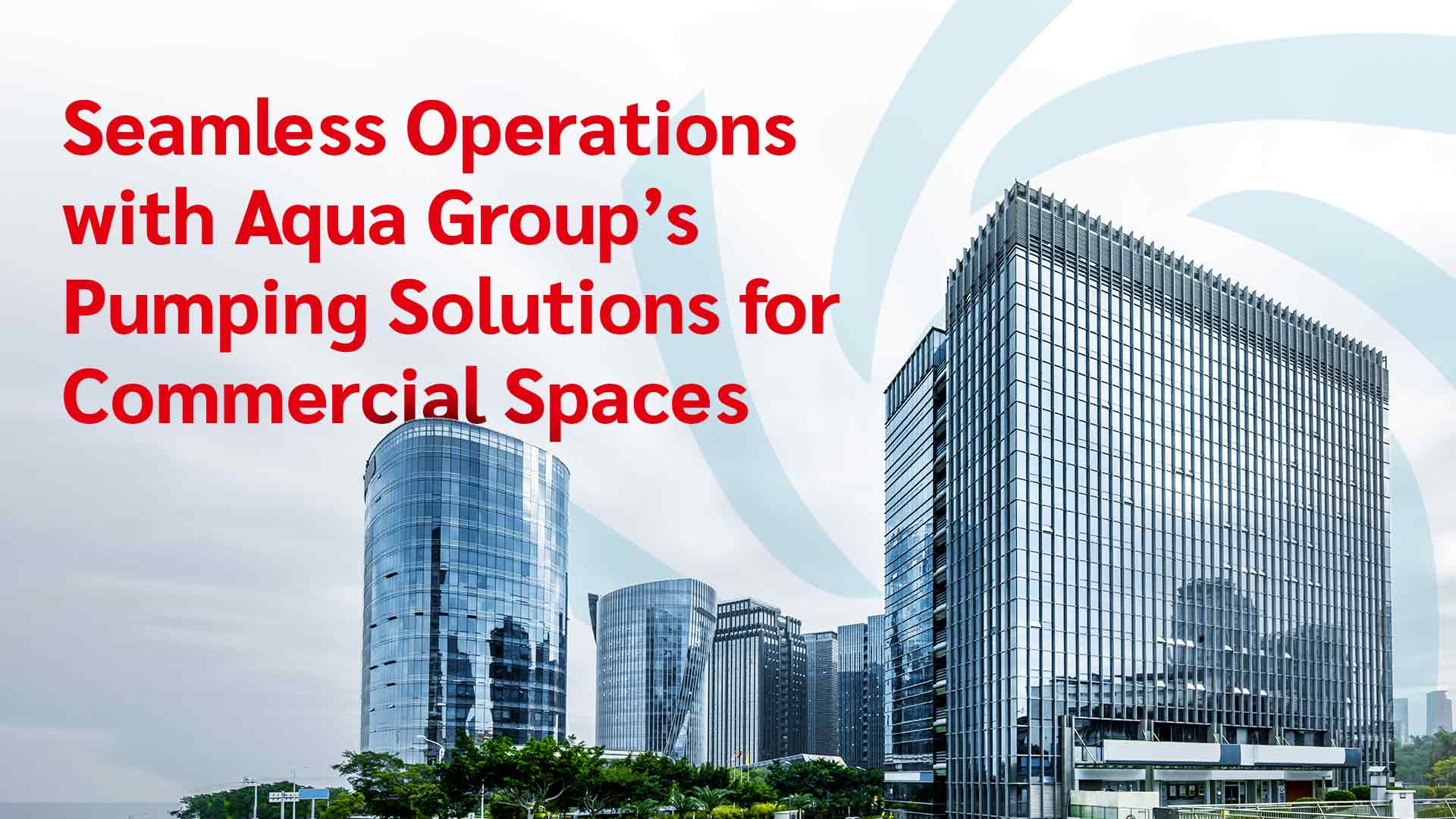
Pumping Systems for Commercial Buildings
29-03-2024
In the realm of commercial building services, the efficient functioning of pumping systems plays a pivotal role in ensuring optimal performance, sustainability, and occupant comfort. From Hydropneumatic system to HVAC system, reliable
pumping solutions are indispensable for maintaining smooth operations within commercial properties. In this article, let us delve deep into the intricacies of pumping systems tailored for commercial building services, providing valuable
insights and practical advice to industry professionals and stakeholders.
The Importance of Pumping Systems in Commercial Buildings:
Pumping systems serve as the heart of various operations within commercial buildings, facilitating the movement of water for heating, cooling, pressurised water supply, and wastewater management.
Commercial buildings encompass a diverse array of spaces, each with unique requirements for pumping systems. From office complexes to shopping malls, hotels, and hospitals, efficient water distribution, drainage and HVAC circulation are
essential for maintaining comfort and functionality. Key applications of pumping systems in commercial buildings include:
1) Pumping Systems in Commercial Buildings:
Hydropenumatic systems: Providing uniform pressure in all outlets.
Plumbing Infrastructure: Providing water supply and managing wastewater through sewage and drainage systems.
Fire Protection Systems: CSupplying water to fire sprinkler systems for emergency fire suppression.
2) HVAC Systems:
HVAC Systems: Circulating water or refrigerant for heating, ventilation, and air conditioning.
Water Features: Maintaining decorative fountains, waterfalls, and other architectural water features.
Advancements in Pump Technology:
Recent advancements in pump technology have revolutionized the way we approach commercial building services. Here is the diverse array of cutting-edge pump varieties poised to elevate efficiency and performance in modern infrastructure:
- Variable Speed Pumps: Offer flexibility and energy savings by adjusting pump speed to match varying demand, reducing energy consumption and operational costs.
- Booster Pumps: Enhance water pressure for multi-story buildings, ensuring adequate pressure boosting for domestic and commercial applications.
- Submersible Pumps: Submerged in water, these pumps are commonly used for drainage, sewage, and wastewater management in basements and underground facilities.
Selecting the Right Materials:
- Centrifugal Pumps: Ideal for HVAC systems, these pumps utilize centrifugal force to circulate water or coolant, providing efficient heating and cooling.
- Additionally, selecting seals and bearings designed for durability minimizes leaks and maintenance requirements, further enhancing the performance of your booster pump system.
1) Best Practices for Selecting Pumping Systems in Commercial Buildings:
Installation and: Control Considerations.
Selecting the appropriate pumping system for commercial building services requires careful consideration of various factors, including:
System Design and Sizing:
-
Conduct a thorough analysis of the building's requirements, considering factors such as flow rate, pressure, head, and system dynamics. Collaborate with experienced engineers to design pumping systems tailored to the specific
needs and challenges of the commercial property.
Energy Efficiency:
-
Opt for energy-efficient pumping solutions to minimize operational costs and reduce environmental impact. Consider variable frequency drives (VFDs) and high-efficiency pumps to optimize energy consumption based on fluctuating
demand. -
Ensure redundancy and reliability by incorporating backup pumps and systems to mitigate the risk of downtime and system failure. Implement predictive maintenance strategies to detect potential issues early and prevent costly
disruptions.
2) Maintenance and Troubleshooting Strategies:
Maintenance System: AQUATEX
Regular maintenance is crucial for preserving the performance and longevity of pumping systems in commercial buildings. Scheduled inspections, lubrication, and component replacements help prevent breakdowns and costly downtime.
Additionally, troubleshooting techniques such as pressure testing, flow rate analysis, and monitoring system parameters aid in identifying and resolving issues promptly.
Advantages:
- Prevents clogging by effectively macerating solids and fibrous materials, ensuring uninterrupted flow.
- Well-suited for low-flow, high-head applications commonly found in residential and commercial settings.
Considerations:
- Maintenance involves periodic clearing of debris from the grinder mechanism to maintain optimal performance.
- Proper sizing is critical to ensure the pump can effectively handle the anticipated solids load without overload or failure.
Factors to Consider When Selecting Wastewater Pump Types:
Application Requirements: Assess the specific needs of the wastewater pumping application, including flow rate, head pressure, and solids-handling capability.
Operating Conditions: Consider environmental factors such as temperature, pH levels, and the presence of corrosive substances when selecting pump materials and construction.
Maintenance and Reliability: Evaluate the ease of maintenance and accessibility of pump components, and choose pumps from reputable manufacturers known for reliability and durability.
Energy Efficiency: Opt for energy-efficient pump models to minimize operating costs and reduce environmental impact. Features such as variable frequency drives (VFDs) can help optimize energy usage.
AQUA GROUP: Harnessing Decades of Pump Manufacturing Experience
Experience the difference AQUA GROUP can make in optimizing your water pressure needs today.

Elevating Efficiency and Reliability with AQUA GROUP
AQUA GROUP’s commitment doesn't cease with product delivery. They take pride in providing comprehensive after-sales service to ensure seamless operation and enduring satisfaction with their pumping solutions. Furthermore, the
products are engineered with a focus on power saving, leveraging advanced technologies to minimize energy consumption and lessen environmental impact. With AQUA GROUP, Customers can rely on both the reliability of their products and the
ongoing support provided to optimize efficiency and sustainability in their commercial properties.
In conclusion, pumping systems are integral to the efficient operation and sustainability of commercial buildings. By adhering to best practices in system design, energy efficiency, reliability, and integration, industry professionals
can maximize the performance and longevity of pumping infrastructure in commercial properties. As a trusted partner, AQUA GROUP remains committed to providing innovative pumping solutions that meet the evolving needs of the industry,
ensuring optimal performance and customer satisfaction.
